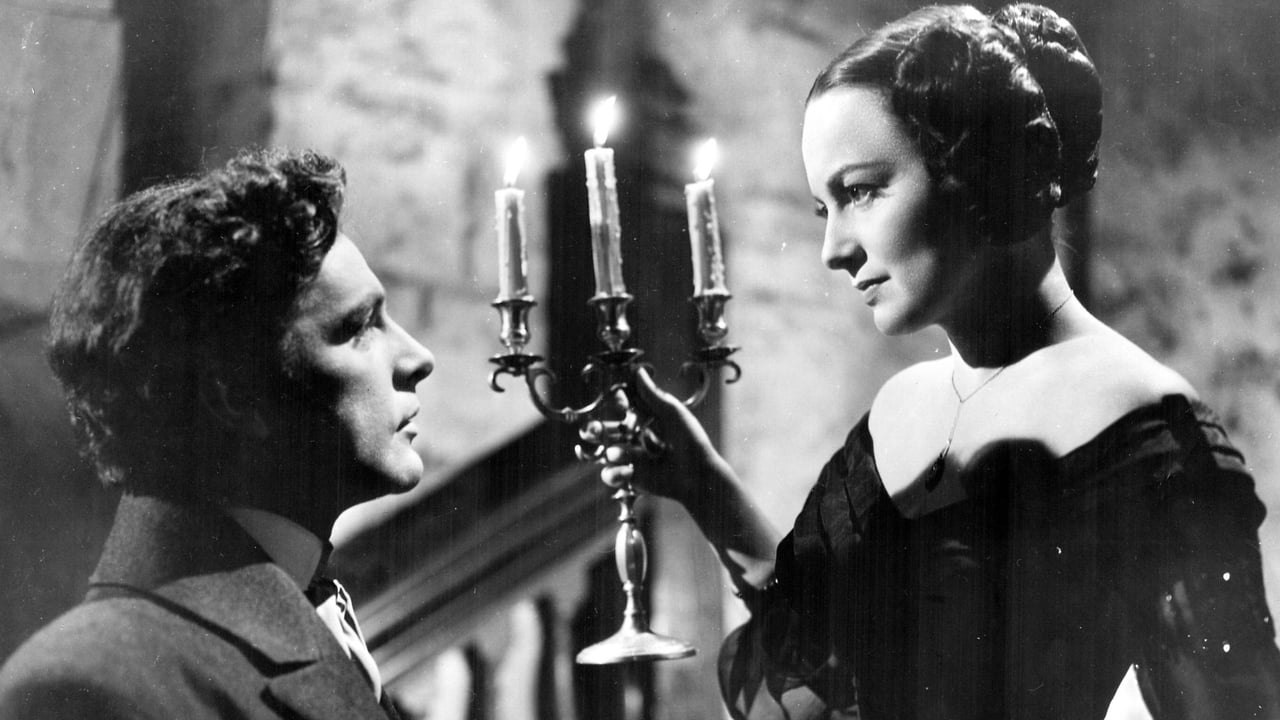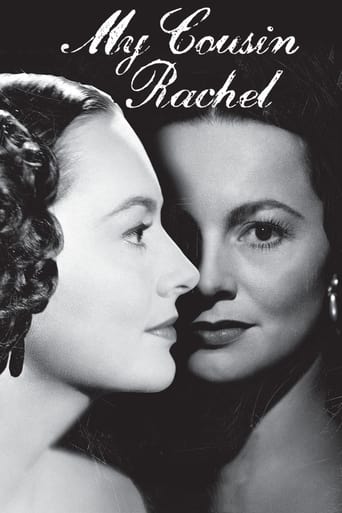

The story of manipulation, headaches and hormones - it's hard to tell who or what will win, perhaps destiny? Richard Burton as the smitten young heir and Olivia de Havilland as the conniving widow give excellent performances. Cousin Rachel is such a bitch, you want her dead. But, is she really that bad?
... View MoreThis is an excellent adaptation of the Daphne De Maurier novel and the casting is very well done. Olivia de Havilland is excellent in the role of Rachel. Rex Harrison in his first US film is a young vibrant Philip Ashley. Any confusion with another man Olivia was married to in GWTW should be discarded. As the film starts, Philip is getting mystery letters from Rachel husband, his brother, that Rachel is killing him. The letters are so strange he makes as quick a trip as possible to his Italian Villa. By the time he arrives, it is too late, his brother is dead. When he meets Rachel, the letters have already given him a negative view of her. Then her beauty and plotting wins him over. His brother has left Philip the entire estate.Then Rachel starts to seduce him and manages to take everything Philip has inherited from him. Philip takes ill, and begins to suspect Rachel has something to do with his problems. This film smartly leaves it to the viewer to decide if Rachel was playing him and trying to kill him or not and the film plays the viewer to a lot of wonder as to who is doing what.
... View MoreThe ending. That's what is commented on most and with good reason. Because the resolution is purposely ambiguous, it disappoints or frustrates many.I think the ending, which does not stamp the seal of innocence or guilt upon Rachel, is appropriate to the story. The plot carefully builds two sides to Rachel's character. She is either the sweetest warmest person ever, or a fortune seeker where marriage and murderer are not out of the question. The story builds a strong case for both perspectives. This is the larger point of the story - it's about perceptions, communication and judgments humans make, that we sometimes have to make without the ability to determine the truth and the inherent danger in doing so. This is how life sometimes is - nowadays we call them gray areas. My Cousin Rachel it's not necessarily a mystery story that needs to be resolved, but more truly a comment on the folly of human interactions, especially where money and greed are involved.Yet even if you demand a solid resolution, the ending should not be seen as a let-down. If you believe the story shows her guilt more prominently, then in the end you can argue that fate stepped in, (seconds too late) and justice was done - she paid with her life for murder, as the opening death scene foretold. On the other hand If you believe her innocent, then her murder can be explained in her extremely poor manner of showing and communicating her intentions, leaving highly bad impressions to those it mattered most.I think my reading of the outcome is backed up by the fact then when the author of the novel was asked about the innocence of Rachael, she herself did not know. Solving the mystery was not the author's intention. Brent Chastain top3films.com
... View More"My Cousin Rachel", like Hitchcock's "Rebecca" from twelve years earlier, is based on a novel by Daphne du Maurier. Both films are Gothic melodramas set in Cornwall, and both have a wealthy landowner as the main male character. Another link is that the female lead is played in "Rebecca" by Joan Fontaine and here by her sister Olivia de Havilland. One difference between the two, however, is that "Rebecca" has a contemporary setting, whereas "My Cousin Rachel" is a period piece set in the early nineteenth century. This is not, however, the sort of "heritage cinema" costume drama with which we are familiar today. Ever since the sixties, it has been customary for films set in the 1800s to be made in colour, often sumptuous colour, with an emphasis on a detailed recreation of the costumes and furnishings of the era. In the fifties, however, it was quite common for such films to be treated as a sort of period version of film noir, in black and white with dramatic, expressionist photography. "Blanche Fury" is a British example of this phenomenon, and "Carrie" another American one. The film has a particularly dramatic opening scene. Ambrose Ashley, a Cornish gentleman, is out walking along the coast with his young cousin Philip, an orphan whom Ambrose has adopted as his son. As they walk they see a body swinging on a gibbet and Ambrose turns to Philip and says: "Always remember, Philip, death is the price for murder."Fast forward about twenty years. Ambrose, who has been advised to move to warmer climes for the sake of his health, goes to live in Florence where he marries the Countess Rachel Sangalletti, the English-born widow of an Italian aristocrat. Shortly afterwards, Ambrose dies in mysterious circumstances, leaving his estate to Philip rather than his new wife. Philip is convinced, on the basis of a few mysterious letters from his cousin, that Ambrose was in fact murdered by Rachel, but when she travels to England and he meets her, he falls desperately in love with the beautiful older woman. (Philip is 25, Rachel probably in her mid- thirties). As their relationship progresses, however, Philip's suspicions about Rachel return, and he begins to suspect that she might be planning to murder him to secure ownership of the estate.The film's main problem is that it is never made clear whether or not Rachel murdered Ambrose or whether she is plotting to kill Philip. We spend about half the film thinking that she is the victim of unjustified suspicion and the other half believing that she may well be guilty of the crimes of which she is suspected. I don't intend to examine all the conflicting evidence with which we are presented, as fedor8 has already done this in his helpful review which sets out both the case for Rachel's innocence and the case for her guilt. The truth is never really established, and the film's ambiguous ending does not assist in this regard. In some artistic contexts ambiguity can be beneficial, but I feel that a Gothic suspense drama like this one needs to draw a clearer line between virtue and villainy. The film does, however, also have its strong points. As mentioned above, its stark photography is very effective, and it was nominated for an Academy Award for Best Cinematography. There are also two excellent acting performances from De Havilland as Rachel and a young Richard Burton as Philip. I would not agree with those who see Philip as a Heathcliff figure- Emily Bronte's hero was always something of a threatening outsider, whereas Philip the wealthy country gentleman is really an insider, part of the system. Perhaps a more accurate comparison would be with a younger version of Mr Rochester from "Jane Eyre"- proud, impulsive, wilful, capable of both great generosity and great folly. Burton, one of several possible contenders for "greatest actor never to win an Oscar", deservedly received the first of his seven nominations for this film. (His second nomination came the following year for "The Robe", a film directed by the same director, Henry Koster). Oddly, his nomination here was in the "Best Supporting Actor" category, even though his is very much a leading role. One might have thought that the ambiguity surrounding Rachel would have given De Havilland a problem as to how the character should be played. She is able, however, to give a very nuanced performance, suggesting both Rachel's lovability and her possibly sinister side. Another good contribution comes from the lovely young Audrey Dalton, in her debut film, as Louise, the young girl who loves Philip but fears losing him to Rachel. Audrey was a highly promising young actress who never really went on to become a major star, although she was to give another memorable performance in "Titanic" the following year. Some have speculated that the film might have been improved had it been directed by Hitchcock rather than Koster, but the Master was never really comfortable with period drama. His attempt to film Du Maurier's "Jamaica Inn" resulted in one of his least memorable movies. He might have brought a greater sense of suspense to certain scenes, but I suspect that even he would have had difficulty in overcoming the problem of the ambivalence surrounding Rachel's guilt or innocence. 6/10
... View More